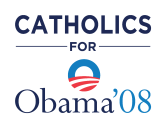 Last week ,we told you that Barack Obama has been able to gain support among support among Latino Evangelical Christians, a group that came out in strong numbers for George W.Bush in 2004. Many wondered whether groups such as these would support Obama due to his stance on social issues such as abortion. Polls now indicate that Latino Catholics may also be leaning towards the Democratic presidential ticket despite the parties Pro-Choice stance. This is significant because Latino Catholics compose a notable share of the electorate in states like Colorado, Florida, Nevada and New Mexico. Gabino Zavala, an auxiliary bishop in the Los Angeles Archdiocese offers his insights on the reasons why he believes many Catholics are supporting Barack Obama…
Last week ,we told you that Barack Obama has been able to gain support among support among Latino Evangelical Christians, a group that came out in strong numbers for George W.Bush in 2004. Many wondered whether groups such as these would support Obama due to his stance on social issues such as abortion. Polls now indicate that Latino Catholics may also be leaning towards the Democratic presidential ticket despite the parties Pro-Choice stance. This is significant because Latino Catholics compose a notable share of the electorate in states like Colorado, Florida, Nevada and New Mexico. Gabino Zavala, an auxiliary bishop in the Los Angeles Archdiocese offers his insights on the reasons why he believes many Catholics are supporting Barack Obama…
Catholics, who are quintessential swing voters and gave narrow but crucial support to President Bush in 2004, are drifting toward Barack Obama. And this time, some church leaders are suggesting that single-issue voting is by no means a Catholic commandment. In an interview this, Gabino Zavala, an auxiliary bishop in the Los Angeles Archdiocese, said his fellow bishops have long insisted that “we’re not a one-issue church,” a view reflected in their 2007 document “Forming Consciences for Faithful Citizenship.”
“But that’s not always what comes out,” says Zavala, who is also bishop-president of the Catholic peace group Pax Christi USA. “What I believe, and what the church teaches, is that one abortion is too many. That’s why I believe abortion is so important. But in light of this, there are many other issues we need to bring up, other issues we should consider, other issues that touch the reality of our lives.”
Those issues, Bishop Zavala said, include racism, torture, genocide, immigration, war and the impact of the economic downturn “on the most vulnerable among us, the elderly, poor children, single mothers.”
“We know that neither of the political parties supports everything the church teaches,” he added. “We are not going to create a culture of life if we don’t talk about all the life issues, beginning with abortion but including all of them.”
Zavala was careful to say that he did not want to take issue with any of his fellow bishops. Indeed his view contrasts with that of others in the hierarchy. But Bishop Zavala’s desire to speak out with an alternative view is a sign of how much has changed in four years: Progressive Catholics are now as organized as conservative Catholics were in 2004. At Web sites such as http://ProLifeProObama.com, they are arguing that the abortion question does not trump all other concerns.
The impact of the new Catholic politics could be substantial. Catholics are often a decisive electoral group partly because church membership ranges from upscale to working-class whites, a large group of Latinos, and a significant number of African Americans.
Catholics typically make up about a quarter of the electorate, and they are strategically located. White (non-Latino) Catholics are important in such swing states as Ohio, Pennsylvania and Wisconsin, while Latino Catholics make up a notable share of the populations of New Mexico, Colorado, Nevada and Florida.
Polls have varied in measuring the Catholic shift toward the Democrats, but Obama seems to be running ahead of John Kerry‘s performance in 2004. According to the network exit polls, Bush carried 52 percent of the Catholic vote to 47 percent for Kerry. By contrast, a mid-October Pew Research Center survey showed Obama leading John McCain among Catholics by 55 percent to 35 percent.
Post surveys over the same period have found more modest Catholic gains for Obama. A Post tracking poll released yesterday showed Obama and McCain splitting the Catholic vote at 48 percent each. Obama’s Catholic share probably stands somewhere between the Pew and Post numbers. But even a split among Catholics could mark a sufficient improvement over Kerry’s performance to tip key states the Democrat’s way.
In many respects, Catholics may simply be a reflection of the country as a whole that seems to be moving toward the Democrats because of frustrations with the economy and the Bush years.

Recent Comments